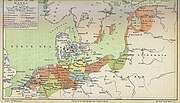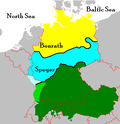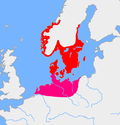In historical linguistics, the German term grammatischer Wechsel ("grammatical alternation") refers to the effects of Verner's law when they are viewed... 12 KB (1,316 words) - 09:12, 25 November 2023 |
relevant for the discussion of the ablaut system. The development of grammatischer Wechsel as a result of Verner's law (the voicing of fricatives after an... 125 KB (12,200 words) - 18:20, 7 April 2024 |
 | syllabic nasals or liquids, e.g. gaffel (fork) from PG *gabalō. Grammatischer Wechsel: Because of sound changes in Proto-Germanic (cf. Verner's law),... 44 KB (4,986 words) - 12:12, 14 April 2024 |
boog, gebogen ("to bend"). The verbs vriezen and verliezen show grammatischer Wechsel, with s/z changing to r in the past tense: vriezen, vroor, gevroren... 41 KB (4,392 words) - 15:25, 11 April 2024 |
lētans (to have). In Proto-Germanic, consonant alternations known as grammatischer Wechsel developed, as a result of Verner's law. This involves an originally... 29 KB (2,932 words) - 16:56, 19 April 2024 |
For more on these phonemes from a comparative perspective, see Grammatischer Wechsel. For the developments in German and Dutch see High German consonant... 43 KB (4,878 words) - 11:20, 10 April 2024 |
 | A phonological archaism of West Germanic is the preservation of grammatischer Wechsel in most verbs, particularly in Old High German. This implies the... 57 KB (4,752 words) - 05:52, 10 April 2024 |
alternation of *s and *r in some inflectional paradigms, known as grammatischer Wechsel. For example, the Old English verb ceosan 'choose' had the past... 20 KB (2,176 words) - 06:57, 14 April 2024 |


